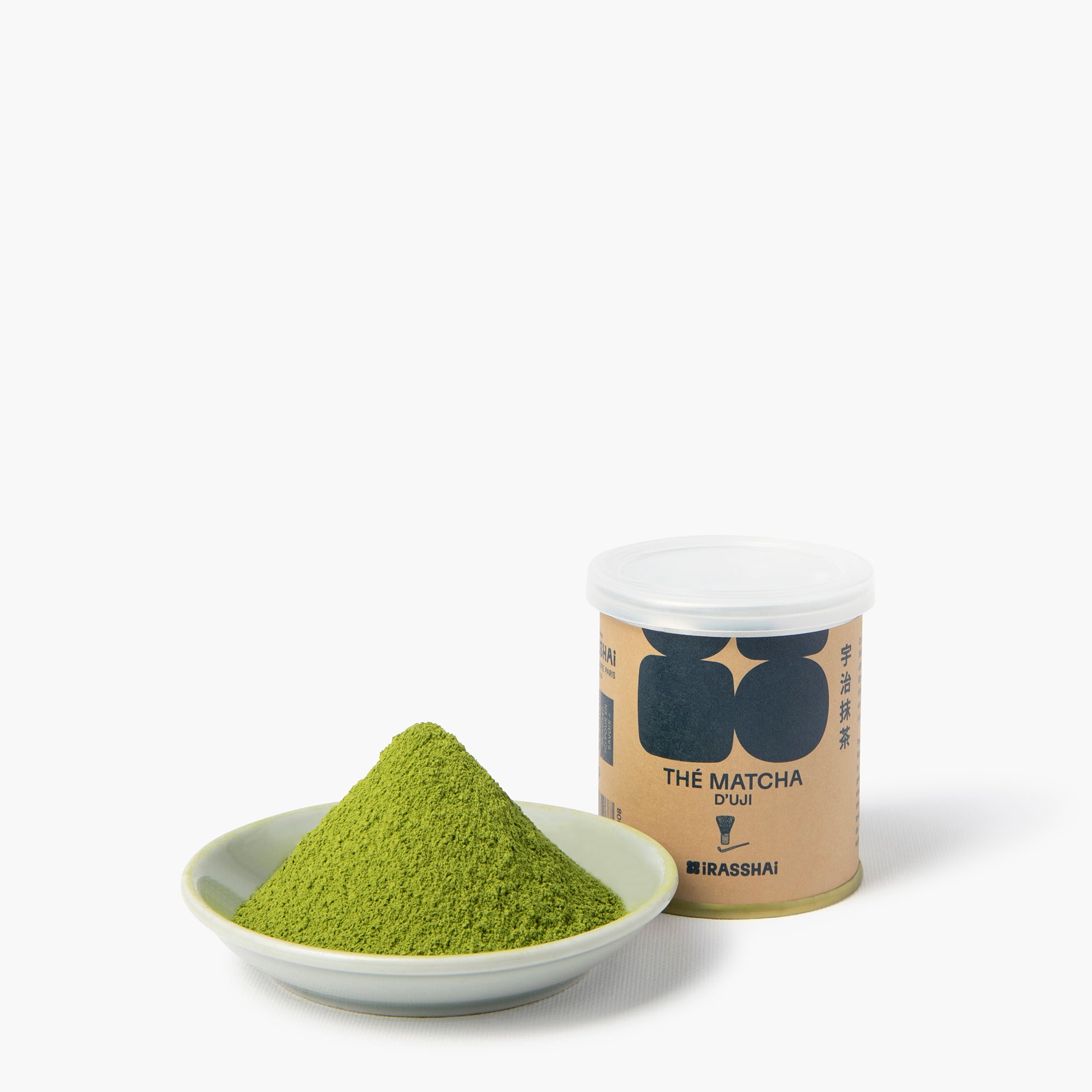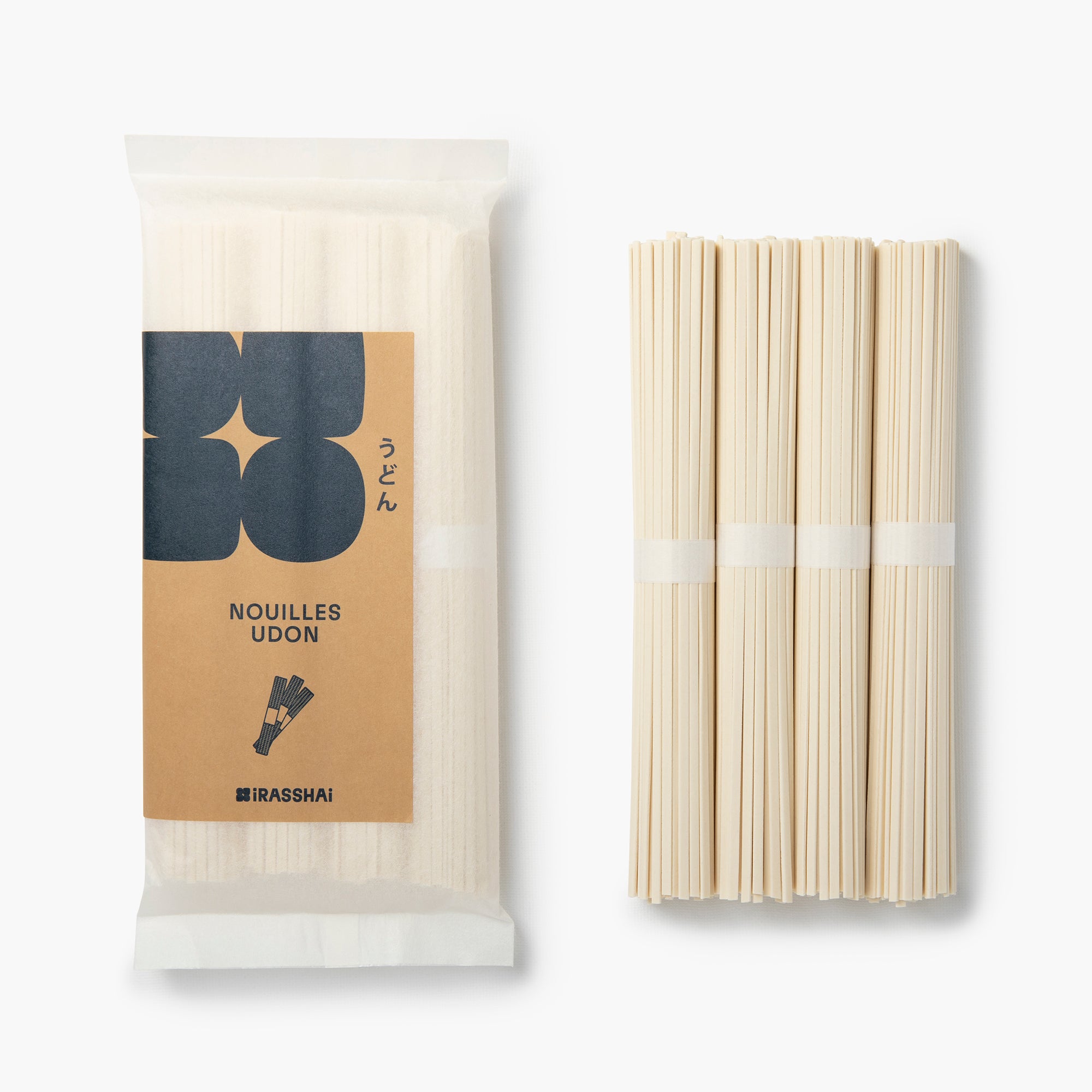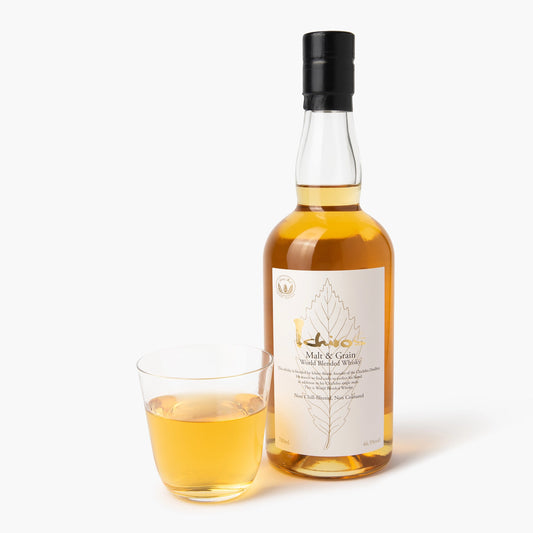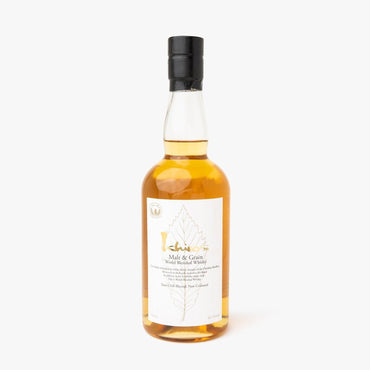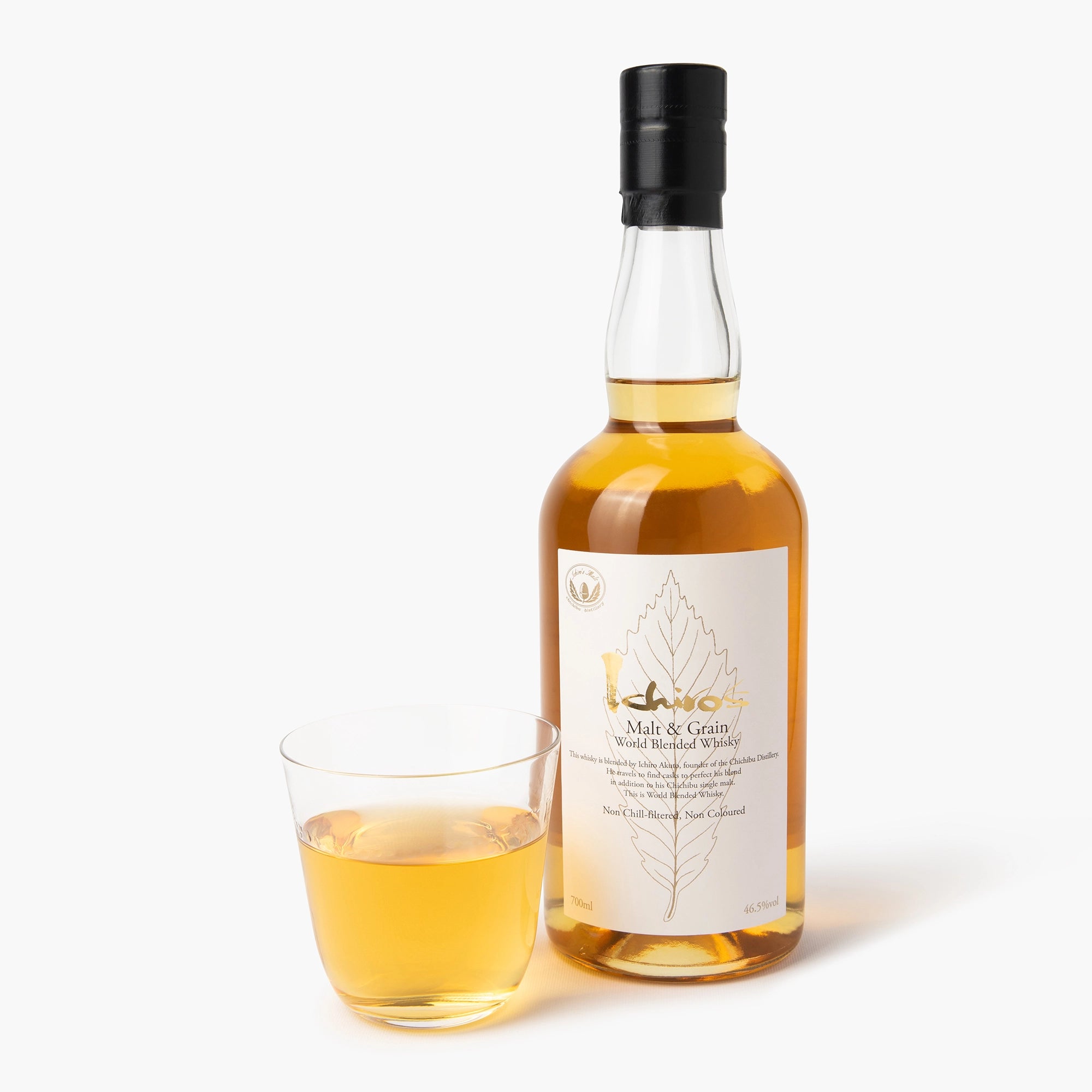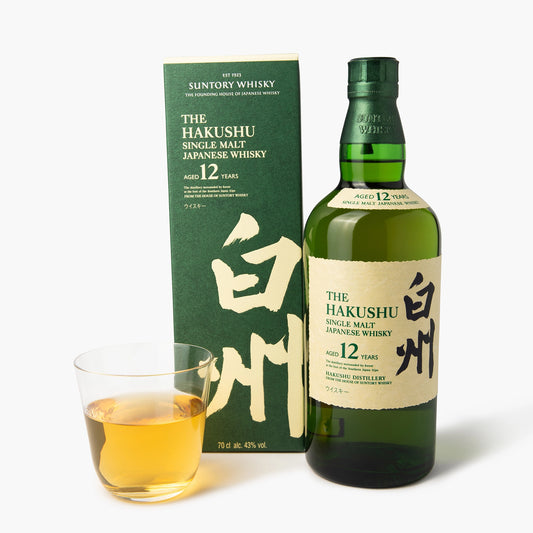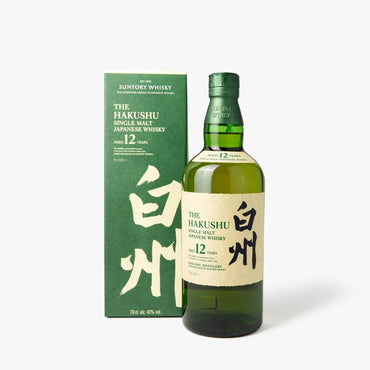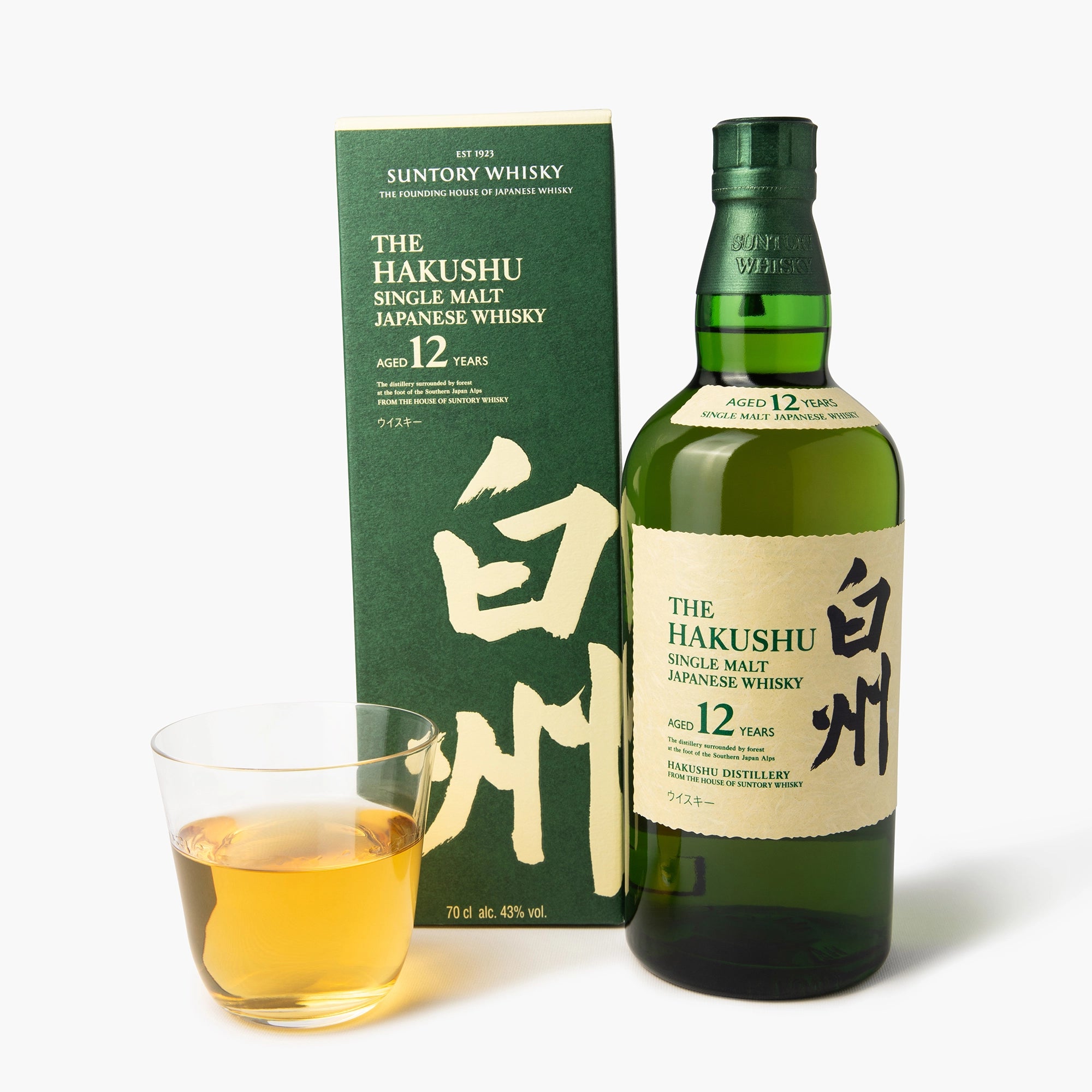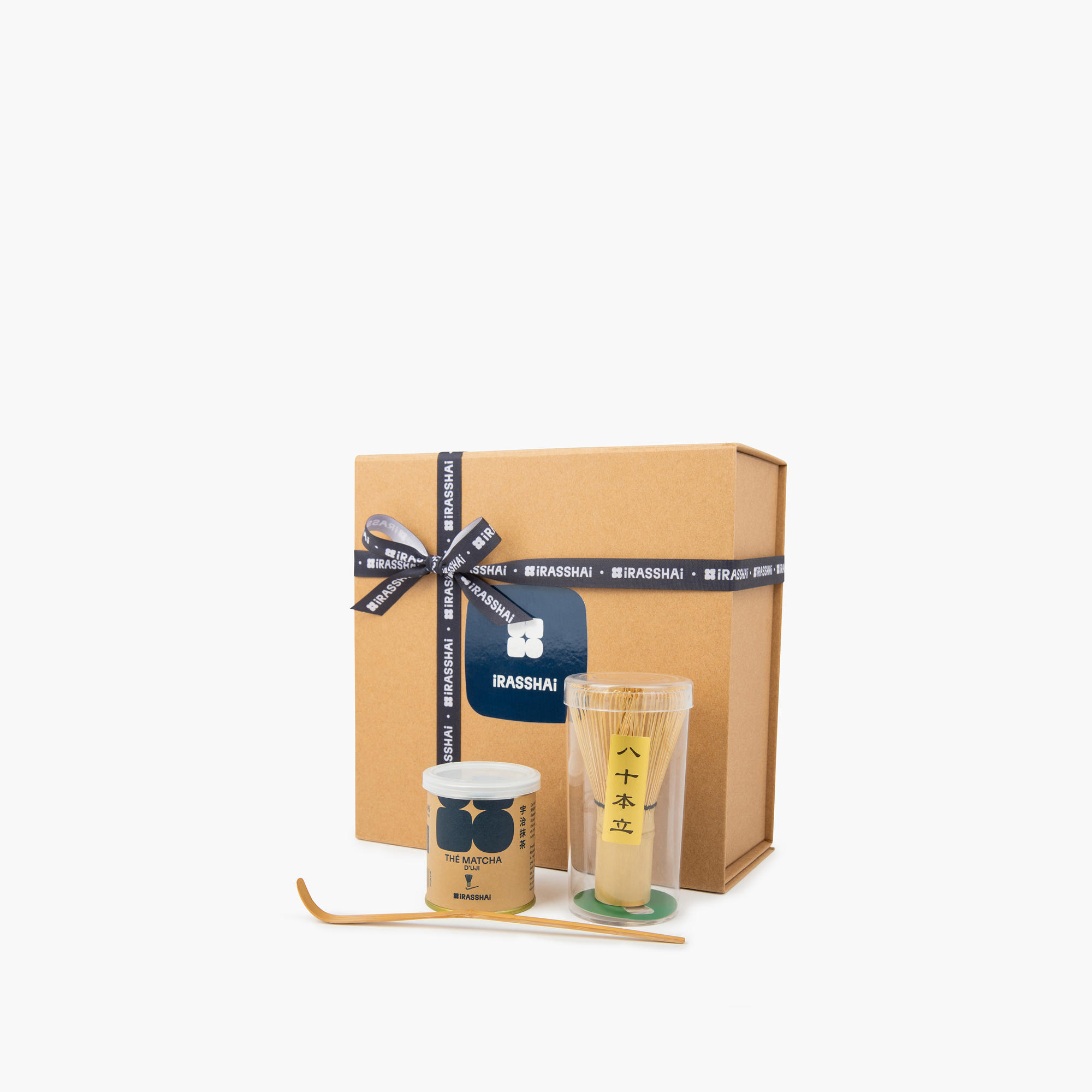Our Christmas gift sets
-
Box set ⋅ MATCHA RITUAL ⋅ iRASSHAi
Regular price 37.00 €Prix promotionnel 37.00 € Regular pricePrice per unit per
Find out more about Japanese whisky
What makes Japanese whisky so special?
Japanese whisky has a number of distinctive features that set it apart from other whiskies, notably Scotch, Irish and American. Here are the main characteristics:
Scottish inspiration:
The first Japanese distilleries were created with the help of Scottish master distillers, and many of the production techniques and whisky styles are directly inspired by Scotch whisky.
Terroir and ingredients:
- Use of Japanese spring water, renowned for its purity, which significantly influences the taste.
- Use of specific cereals, often imported from Scotland, but sometimes grown locally.
Craftsmanship and attention to detail:
- Great precision and care in the production process, from ingredient selection to distillation and ageing.
Distillation and ageing:
- Use of different still shapes, often inspired by those used in Scotland, but with modifications for unique flavor profiles.
- Aging in a variety of casks, including Japanese oak (mizunara) casks, which bring distinctive notes of sandalwood, coconut and spices.
Climate and environment:
Japan's climate, with its seasonal temperature variations, accelerates certain aspects of aging, influencing the maturation and complexity of flavors.
Various styles:
Japanese whisky is not limited to a single style; it can be peated or unpeated, light or robust, simple or complex - from single malt through blended to blended malts.
Innovation and experimentation:
Japanese distilleries are renowned for their innovation and willingness to experiment with new production techniques, new cask types and innovative blends.
Worldwide recognition:
Japanese whiskies have received numerous international awards, contributing to their worldwide renown.
The quality and finesse of Japanese whiskies are often compared to the best Scotch and Irish whiskies.
Presentation and culture:
The importance of aesthetics in the presentation of bottles and labels, often inspired by Japanese culture and traditional design.
Whisky consumption in Japan is often linked to rituals and traditions, such as the use of large, hand-carved ice cubes.
These characteristics make Japanese whisky a distinctive product sought after the world over, appreciated for its exceptional quality, diversity of flavors and elegance.
What are the main categories of whisky?
Whisky comes in a variety of types, classified mainly according to the type of grain used and the distillation process. Here are the main categories of whisky:
- Single Malt Whisky: Whisky made at a single distillery, using only malted barley.
- Single Grain Whisky: Whisky produced at a single distillery, but using cereals other than malted barley (corn, wheat, etc.).
- Blended Whisky: A blend of whiskies from different distilleries, usually including single malts and grain whiskies.
- Bourbon: American whisky made mainly from corn (minimum 51%).
- Rye Whisky: American or Canadian whisky made from rye (at least 51%).
- Irish Whiskey: Whisky produced in Ireland, generally lighter and triple-distilled.
- Japanese Whisky: Whisky made in Japan, often inspired by Scottish methods, but with a unique, balanced style.
- Peated Whisky: Whisky where the barley is peat-dried, offering smoky, earthy aromas.
- Blended Malt Whisky: A blend of single malts from different distilleries, with no added grain whisky.
- Corn Whisky: Whisky made mainly from corn (minimum 80%), mainly produced in the United States.
How to choose a whisky for beginners?
For beginners, it's best to choose a smooth, well-balanced whisky without a marked intensity (e.g. too peaty or spicy). Opt for :
- Non-peaty (avoid smoky and iodized aromas if you're not used to them).
- With an alcohol content of around 40-43%, which are generally sweeter.
Tasting method :
- Pure: Try whisky as is, at room temperature.
- With a little water: Add a few drops of water to reduce the alcoholic intensity and reveal the aromas.
- Cocktails: Mild whiskies, such as bourbon or blend, lend themselves well to cocktails (for example, a whisky sour or a highball).
We recommend the ideal whisky for beginners in our catalog:
- Suntory Chita Whisky
A single grain whisky distilled from corn, offering notes of caramel, pear, honeysuckle, oak, maple syrup, vanilla and cinnamon. Ideal for any occasion.
- Yamazaki Distiller's Reserve
Quite smooth, with woody notes of dried fruit, strawberries, peaches and spices. Perfect for sipping neat, on the rocks or in simple cocktails.
- Yamazaki 12 ans
A classic with notes of jasmine, cinnamon, candied orange, peach and apple, harmonized with a dry finish of cedar wood.
What is "peated whisky"?
A peated whisky is a type of whisky in which the barley (one of the main ingredients) is dried in the presence of peat, a partially decomposed organic material found in peat bogs. Peat is used as fuel in the barley-drying process, giving the whisky its characteristic smoky, earthy aromas. It is appreciated by lovers of strong, complex flavors, and provides an interesting contrast to sweeter, fruitier whiskies.
The best-known peated whiskies:
- Whiskies from Islay (Scotland): Whiskies produced on the Isle of Islay, such as Laphroaig, Lagavulin or Ardbeg, are among the most famous for their pronounced peatiness. These whiskies often have very powerful, intense flavors.
- Speyside whiskies: Some Speyside producers, like The GlenDronach, finish their whiskies in barrels that have contained peat, which adds more subtle hints of smoke.
How is whisky made?
The production of whisky follows a number of fundamental stages that transform the basic ingredients into a complex spirit. Here are the main stages in whisky production:
1.Malting (for malt whisky)
The main ingredient in whisky is grain (usually barley for malt whisky, but also corn or rye for other types).
Process :
The barley is soaked in water to stimulate germination. This step releases the enzymes that convert starch into fermentable sugars. Next, the germinated barley is kiln-dried, often using peat for a smoky taste (particularly for peated Scotch whiskies).
2. Mashing
Malted barley is milled into grains and then mixed with hot water in a mash tun to extract the sugars. This process creates a sweet mash, called wort, which contains the sugars needed for fermentation.
3. Fermentation
The must is transferred to fermentation tanks where yeast is added. The yeasts convert the sugars in the must into alcohol and CO2. This process lasts 3 to 5 days, producing an alcoholic liquid called wash, with an alcohol content of around 6-8%.
4. Distillation
- Still distillation (for malt whisky): The wash is then distilled in a copper still. The first distillation produces a liquid called "low wines", then a second distillation refines the whisky, separating out the finest parts, the "hearts", which will be used for aging.
- Column distillation (for grain whisky): For grain whiskies, distillation is carried out in a column (continuous distillation), producing a purer, lighter spirit.
Whisky is distilled to higher alcohol levels, generally between 60-70% during distillation, before being reduced to the desired concentration before bottling.
5. Ageing (maturation)
The whisky is transferred to wooden (usually oak) casks for ageing, an essential stage which can last several years (often between 3 and 30 years). Wood enables the whisky to absorb aromas, colors and tannins, and contributes to the chemical transformation of the spirit.
Barrels may be new or have been used for other spirits (such as bourbon or sherry), which influences the taste of the whisky. For example, bourbon casks bring notes of vanilla and caramel.
6. Bottling
Once aging is complete, the whisky is filtered, sometimes diluted with water to adjust the alcohol content to the desired level (generally 40% alcohol by volume). It can be bottled directly, or in smaller bottles for the market.
7. Blending (for blended whiskies)
For blended whiskies, several types of whisky (malt and grain) are blended to create a specific flavor profile. This step makes it possible to obtain more balanced or complex whiskies, by combining young and old whiskies for varied results.
What ingredients are used to make whisky?
To produce whisky, the main ingredients are fairly simple, but their combination and transformation during the manufacturing process create a wide variety of flavors. Here are the ingredients used:
- Malted barley: This is the main ingredient in Single Malt Whiskies. Barley is germinated, dried and sometimes peated (for peated whiskies), then used in the fermentation and distillation process.
- Other cereals: In certain types of whisky, such as Single Grain Whiskies or Blended Whiskies, other cereals such as corn, wheat or rye may be used to complement or replace barley.
Water is an essential ingredient in the whisky-making process, used at every stage:
- Water has an important influence on the taste of whisky, and distilleries often choose specific water sources renowned for their purity.
- Yeast: Yeast is used to transform the sugars present in cereals into alcohol during fermentation. Yeast also plays a role in aroma production during this phase. There are specific yeasts for whiskies, which can vary from one distillery to another and influence the final whisky's aromatic profile.
- Peat is a partially decomposed organic material found in regions such as Islay (Scotland). It is used to dry barley, creating the smoky, earthy aromas characteristic of peated whisky. Not all distilleries use peat, but it is essential for certain types of whisky.
What are the best temperatures for serving whisky?
The temperature at which you serve whisky can have a major impact on its aroma and flavor. There are no hard and fast rules, but the following are generally accepted recommendations for different types of whisky:
- Pure whisky :
Ideal temperature: 18-21°C (room temperature)
Serving whisky at room temperature allows you to fully appreciate its aromas. At this temperature, the different nuances of flavor are revealed and the alcohol is less perceptible, leaving room for the whisky's subtle aromas.
If you prefer a cooler whisky, you can chill it slightly to 15-18°C, but it's important not to serve it too cold, as this will inhibit its aromas.
- Whisky with a little ice (On the Rocks)
Ideal temperature: 5-10°C
If you like your whisky on the rocks, the cooling effect varies according to the amount of ice and dilution. Ice helps to soften strong aromas and can slightly open up the whisky's flavors, but be careful not to use too much, so as not to dilute the taste too much.
- Whisky with a little water
Ideal temperature: 18-21°C
Adding a little water helps to open up the whisky's aromas, especially for whiskies with a high alcohol content. The water should be cold (not icy), and in small quantities to avoid masking the flavours.
- Japanese Whisky
Japanese whiskies are often served at a slightly cooler temperature than Scotch or Irish whiskies. Ideally, serve them at 15-18°C or room temperature to appreciate their subtle nuances. Some Japanese whiskies can also be enjoyed over ice to soften their profile.
What is the history of Japanese whisky?
The history of Japanese whisky begins in the late 19th century, when the Japanese discovered the art of whisky distillation. This happened mainly under Western influence, after Japan opened up to international trade in the 1850s.
Masataka Taketsuru, a Japanese man, is often regarded as the founding father of Japanese whisky. In 1918, after studying distillation in Scotland and working in Scottish distilleries, Taketsuru returned to Japan with his know-how.
He joined Shinjiro Torii, founder of the Suntory company, whose ambition was to produce quality whisky in Japan. Together, they opened the Yamazaki distillery in 1923, the first whisky distillery in Japan. It was here that the Japanese whisky tradition began to take shape, inspired directly by Scottish techniques.
The 1930s marked a turning point for the Japanese whisky industry, with brands such as Suntory and Nikka becoming pioneers in the production of quality whisky. After leaving Suntory, Masataka Taketsuru founded his own distillery, Nikka, in 1934. His Yoichi distillery in Hokkaido was inspired by Scottish production methods. He introduced a more robust approach to the aromatic profile, distinct from the smoothness of Suntory whiskies.
The years 1980 to 2000 marked a major turning point in the international renown of Japanese whisky. During this period, Japanese distilleries, still influenced by Scottish methods, perfected their production and won prestigious awards worldwide.
From the 2000s onwards, Japanese whiskies won more and more prizes in prestigious international competitions, which Vendor their entry onto the world stage. Yamazaki 18 Year Old and other Suntory whiskies won gold medals.
Japanese whisky is booming worldwide. The quality of production and attention to detail in ageing, the types of casks used, and the pure water of the Japanese regions all contribute to making Japanese whisky one of the most appreciated and sought-after in the world.
How to store a bottle of whisky after opening?
Once a bottle of whisky has been opened, it's important to store it correctly to preserve its aromas and quality. Here are some tips on how to store a bottle of whisky after opening:
1. Store the bottle in a cool, dark place
- Whisky keeps best at room temperature, between 15 and 20°C. Avoid storing it in places that are too hot or exposed to extreme temperatures, as this could alter its aromas. Also, do not leave the bottle in places where there are significant temperature variations (such as near a radiator or in the kitchen).
- Light, especially direct sunlight, can degrade the organoleptic qualities of whisky. It is therefore preferable to store it in a dark place, such as a cupboard or cellar.
2. Close the bottle tightly
- Replace the cap correctly: Make sure that the bottle cap is screwed on or replaced properly to avoid exposure to air, which could oxidize the whisky and alter its taste over time.
Use a special cork: If you plan to store the bottle for an extended period, you can use a hermetic cork or a vacuum pump to extract air and limit oxidation.
3. Bottle position
- Keep the whisky bottle upright to prevent the liquid from coming into prolonged contact with the cork. This reduces the risk of taste alteration due to contact with wood or cork materials.
4. Short- to medium-term consumption
- If you consume the bottle of whisky fairly quickly after opening, there's no need to worry too much about storage. However, after 6 months to 1 year, some whiskies may start to lose a little in quality, especially if they are often exposed to air.
5. Decrease the volume in the bottle
- If the whisky in the bottle is consumed gradually and there is less liquid, it is important to be aware that the air remaining in the bottle can promote oxidation. If you find that there isn't much whisky left, it may be worth transferring the rest to a smaller bottle to limit exposure to air.
6. Preserving whisky in a cask
- In very specific cases (especially for high-end or collectible whiskies), some people choose to transfer their whisky to a small oak cask to add extra aromas during aging. However, this method is more complex and can alter the flavors of the whisky.
7. Consumption
- Once opened, whisky generally keeps well for several months to 1-2 years, depending on its quality and exposure to air. However, to enjoy the best possible quality, it is advisable to consume it within a year of opening.
What's the difference between 40% and 50% alcohol whisky?
The difference between a 40% whisky and a 50% whisky lies mainly in the alcohol content and its impact on tasting:
- 40% Whisky: Lighter and sweeter, with balanced aromas. It's easier to drink and well suited to beginners or everyday consumption.
- 50% Whisky: Stronger and more intense, with concentrated flavors. It offers a more robust experience and is ideal for experienced whisky lovers. It can also be diluted with water to open up the aromas.
What is Coffey column distillation?
Column distillation (also known as Coffey distillation, after the inventor Aeneas Coffey) is a distillation process used to produce spirits, particularly whisky, more efficiently and continuously than traditional still distillation.
This process uses a large metal column filled with superimposed platforms, where the liquid is heated and the alcohol is separated by evaporation and condensation.
Unlike a still, which requires a multi-stage batch process, column distillation operates continuously, enabling faster, more homogeneous production.
Column distillation is commonly used to produce grain whiskies, which are often lighter and sweeter than still-distilled whiskies.
What types of Japanese whisky does Nikka offer?
Among the great whisky houses, Nikka Whisky stands out for its expertise and product diversity. Nikka Coffey Grain, distilled in Coffey stills, offers a round texture and notes of vanilla and caramel, perfect for lovers of smooth, gourmet whiskies. For a more accessible, lighter experience, Nikka Days is an excellent choice, with its balance of malty sweetness and fruity touches. If you'd like to explore the world of Japanese whisky, the Nikka Japan range offers something for every palate, from the connoisseur to the curious connoisseur.
Alcohol abuse is dangerous for your health, consume in moderation. Ordering alcohol is reserved for people of legal age, in accordance with the legislation in force in your country.



